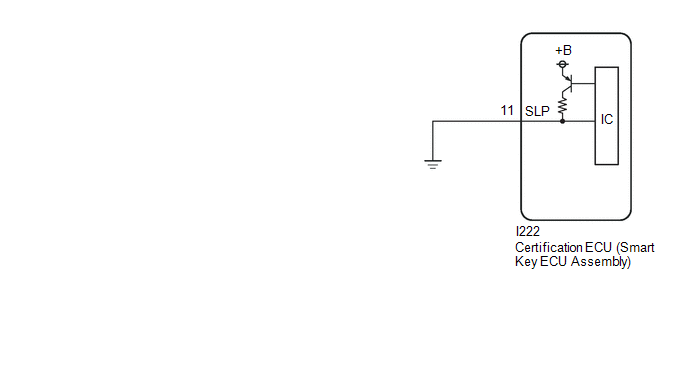Toyota Corolla Cross: Steering Lock Position Signal Compare Failure (B228562)
DESCRIPTION
This DTC is stored when there is no continuity between terminal SLP of the certification ECU (smart key ECU assembly) and ground.
|
DTC No. | Detection Item |
DTC Detection Condition | Trouble Area |
Note |
|---|---|---|---|---|
| B228562 |
Steering Lock Position Signal Compare Failure |
This DTC is stored when there is no continuity between terminal SLP of the certification ECU (smart key ECU assembly) and ground. |
| DTC Output Confirmation Operation:
|
- *1: Only detected while a malfunction is present and the ignition switch is ON.
|
Vehicle Condition when Malfunction Detected |
Fail-safe Function when Malfunction Detected |
|---|---|
|
The engine cannot be started. | The ECU does not send an engine start request. |
|
DTC No. | Data List and Active Test |
|---|---|
|
B228562 | Power Source Control
|
WIRING DIAGRAM

CAUTION / NOTICE / HINT
NOTICE:
- When using the GTS with the ignition switch off, connect the GTS to the DLC3 and turn a courtesy light switch on and off at intervals of 1.5 seconds or less until communication between the GTS and the vehicle begins. Then select the vehicle type under manual mode and enter the following menus: Body Electrical / Smart Key. While using the GTS, periodically turn a courtesy light switch on and off at intervals of 1.5 seconds or less to maintain communication between the GTS and the vehicle.
- The smart key system (for Start Function) uses the LIN communication system and CAN communication system. Inspect the communication function by following How to Proceed with Troubleshooting. Troubleshoot the smart key system (for Start Function) after confirming that the communication systems are functioning properly.
Click here
.gif)
- Inspect the fuses for circuits related to this system before performing the following procedure.
- Before replacing the certification ECU (smart key ECU assembly) refer to Registration.
Click here
.gif)
- After repair, confirm that no DTCs are output by performing "DTC Output Confirmation Operation".
PROCEDURE
|
1. | CHECK FOR DTC |
(a) Check for DTCs.
Body Electrical > Smart Key > Trouble CodesHINT:
If LIN communication is not available, the steering cannot be locked or unlocked.
|
Result | Proceed to |
|---|---|
|
DTC B278588 is output |
A |
| DTC B278588 is not output |
B |
| A |
.gif) | GO TO DTC B278588 |
|
| 2. |
CHECK HARNESS AND CONNECTOR (CERTIFICATION ECU (SMART KEY ECU ASSEMBLY) - BODY GROUND) |
(a) Measure the resistance according to the value(s) in the table below.
Standard Resistance:
|
Tester Connection | Condition |
Specified Condition |
|---|---|---|
|
I222-11 (SLP) - Body ground |
Always | Below 1 Ω |
| OK | .gif) | REPLACE CERTIFICATION ECU (SMART KEY ECU ASSEMBLY) |
| NG | .gif) | REPAIR OR REPLACE HARNESS OR CONNECTOR |

.gif)

